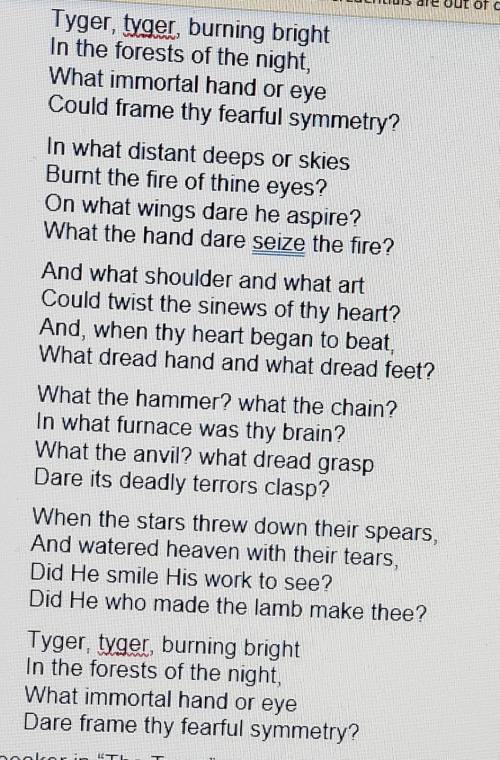
Help ASAP). Read the passage. Then answer the question. " The Tyger" By William Blake. ( The speaker in "The Tyger" questions what great power created the amazing animal that we know as the tiger and how it was done. Read the stanza from the poem: " What the hammer? what the chain? In what furnace was thy brain? What the anvil? what dread grasp. Dare its deadly terrors clasp?" What is the figurative meaning of these lines? How does this meaning contribute to the overall message of the poem? Your response should be one or two complete paragraphs. ( Will Mark Brainliest and Please only answer if you are 100% sure. Need two responces.


Answers: 2


Other questions on the subject: English

English, 21.06.2019 21:30, coreybro
Read the excerpt from julius caesar, act 1, scene 1. marullus. wherefore rejoice? what conquest brings he home? what tributaries follow him to rome to grace in captive bonds his chariot wheels? you blocks, you stones, you worse than senseless35 things! o, you hard hearts, you cruel men of rome, knew you not pompey? many a time and oft have you climbed up to walls and battlements, to towers and windows, yea, to chimney-tops, your infants in your arms, and there have sat40 the livelong day, with patient expectation, to see great pompey pass the streets of rome. which summary of the passage is the best? marullus asks a lot of questions, such as, “why celebrate? what has caesar done? who is following him to rome? don’t you remember pompey? ” then he says that everyone is cruel because they do not remember pompey. they forget how they praised him and would climb to the highest places, carrying their children, just to catch a glimpse of him. marullus regrets that the people are celebrating caesar and is insulted that they forgot how they used to praise pompey. marullus thinks that the people should celebrate caesar the way they used to celebrate pompey, and that they should be in awe of caesar’s greatness. marullus remembers how the people climbed walls, battlements, towers, windows, and even chimney tops to see the great pompey.
Answers: 1

English, 22.06.2019 01:30, erikloza12pdidtx
Analyze lowell’s use of symbolism in the poem “for the union dead.” explain how lowell’s use of symbolism to develop one or more themes in the text.
Answers: 1

English, 22.06.2019 03:30, rclara34oxbrr9
Read this passage: many manufacturers prefer plastic as a material for containers because it can be molded into many shapes. but plastic is not very strong. it must be fused with glass or steel for strength. it is also not very durable. even the strongest plastic can break under enough pressure. the biggest disadvantage to using plastic is that it does not decompose. while plastic can be recycled, doing so is tedious and difficult. while it may be more expensive and difficult to work with, aluminum is a much stronger building material with far greater tensile strength. it conducts electricity because it is metal. best of all, aluminum is very easy to recycle. even if it is thrown away, it decomposes much more quickly than most manufacturing materials. how does the compare-and-contrast organizational pattern of the passage support the author's purpose? a. the passage gradually leads up to the point about decomposition to inform the reader about the importance of recycling plastics. b. the passage lists the advantages and disadvantages of each material to make a case for the use of plastic and not aluminum in containers. c. the passage begins with a description of plastic's problems in order to call attention to the good qualities of aluminum. d. the passage shows the superiority of aluminum in order to make a case for the production of stronger plastics.
Answers: 2
You know the right answer?
Help ASAP). Read the passage. Then answer the question. " The Tyger" By William Blake. ( The speaker...
Questions in other subjects:












